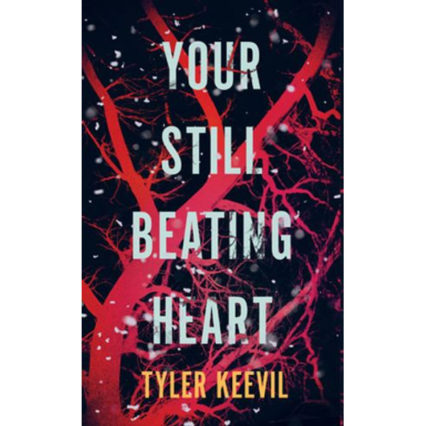Emma Schofield reviews Your Still Beating Heart, the new thriller from Tyler Keevil which places moral dilemmas at the heart of a very human story.
I sat down to read Canadian-Welsh author Tyler Keevil’s latest novel, Your Still Beating Heart, on a drizzly evening when I felt more like planning my hibernation than reading a book. Three hours later I was still sat in the exact same place reading. It’s impossible not to be drawn immediately into the novel which starts with protagonist Eira watching her husband pass away following a random stabbing on a London bus. It’s equally difficult not to be drawn in to her spiralling sense of despair and confusion as she tries to make sense of what happened and the emptiness of the life which now stretches out ahead of her. Tightly structured prose, tension and a vaguely threatening feel which seems to lurk in the background set Keevil’s novel in motion and make it very difficult to turn away, even during its most uncomfortable moments.
These uncomfortable moments come thick and fast throughout the novel. In the opening chapters they are provided through Keevil’s ability to capture Eira’s feelings of utter desolation and helplessness following her husband’s death; there is an almost suffocating sense of despair in the way Eira tries to continue with her job, and other mundane parts of daily life, before realising that she ‘no longer feel(s) anything about it, one way or the other’. These uncomfortable moments only intensify as the setting for the novel switches to Eastern Europe and Eira decides to travel to Prague, revisiting the city where she got engaged. It is against this backdrop of towering architecture and bustling tourism that Eira’s loneliness peaks and leads to her encounter with Mario and his shady circle. As Eira finds herself lured further into Mario’s story she finds herself agreeing to exploit her status as a white, middle-class British tourist to carry out a job trafficking a child from neighbouring Slovakia.
It is within Keevil’s portrayal of how Eira slips so seamlessly into the role of trafficker that the novel raises some of its most challenging questions. Woven into every aspect of the story is the ugly reality of the utter personal devastation brought about by trafficking and the sheer horror of a situation where one life lies completely within the hands of another. As Eira begins her journey back to Prague, with her young charge, a boy named Gogol, concealed within the boot of her car, their lives becomes bound together by her determination to rescue him from the horrific fate which she gradually realises awaits him. Here, the directness of Keevil’s second-person narrative comes into its own. The narrative advises that ‘self-sacrifice won’t be enough. If you don’t survive, he won’t either. Your fates are entwined now, like strands of rope’, drawing you further in until you find yourself feeling almost complicit in the choices being made by Eira.
If the second-person narrative works well to create tension and absorb readers into the story, it does have a few drawbacks. As a general rule, I’m often wary of second-person narratives, in part because of the way they narrow the reader’s field of vision, leaving little room for context or alternative perspective. Yet in a novel such as this, which is unashamedly a thriller, the intimacy of the narrative certainly heightens the tension and uncertainty of Eira and Gogol’s attempted escape. There are a few hiccups with this approach, of course. At times, there are questions which remain unanswered and the singular focus within the narrative has the feel of a story which has been written with a dramatic adaptation in mind; it’s certainly easy to envisage the novel making the transition to a short TV series with relatively little difficulty. Whether it’s a style of writing you generally prefer or not, it’s undeniable that it works well in this context.
As you might expect in a novel which ultimately focuses on the human reality of people trafficking, there are some challenging moments, not least in the limited, but gory, detail of human organ harvesting which the traffickers plan to carry out. Yet the casual remarks revealed, often as an aside within the wider narrative, is where Your Still Beating Heart really comes into its own. The observations, such as Eira’s surprise at how light Gogol’s emaciated body feels as she lifts him carefully into the bath and the chilling effect of the crime ring’s view that ‘a boy is no different to an adult… no different to any other package’ make for uneasy reading. These details, more than the menacing threats raised by Mario and his boss, Valerie, have the power to bring home the true cost of one of the bleakest criminal activities still prevalent within our world.
Amongst this darkness, there is some light. The protective bond which starts to grow between Eira and Gogol offers warmth to the story, as does Eira’s friendship with her landlady in Prague, Marta. The willingness to put others first, to the extent of sacrificing their own safety, makes these relationships both believable and something of a relief against the cruelty and coldness demonstrated by those caught up in the human trafficking ring. At its core, this is a human story, one about grief and love and having the strength to fight for what is right. In exploring the choices made by Eira as she stumbles through the early stages of grieving for her husband and finds herself faced with challenging moral dilemmas, Tyler Keevil is able to bring together an emotion which will be familiar to so many, with a world about which the majority of us are likely to be fortunate enough to have never personally experienced.
Above all, what really stands out throughout Your Still Beating Heart is Keevil’s distinctive writing style and his ability to lead readers to question the choices they would make if they found themselves confronted with a situation such as the one Eira unwittingly finds herself in. This is a snappy and pacey read which makes for an excellent page-turner and a poignant reminder of the frailty of human life.
Your Still Beating Heart by Tyler Keevil is out now and is available through Myriad Editions.
You might also like…
Carly Holmes reviews the humourous western novel by Tyler Keevil, No Good Brother, which follows a pair of flawed but likeable men.
Emma Schofield is a Senior Editor at Wales Arts Review and is currently working on a book based on her research to date.











